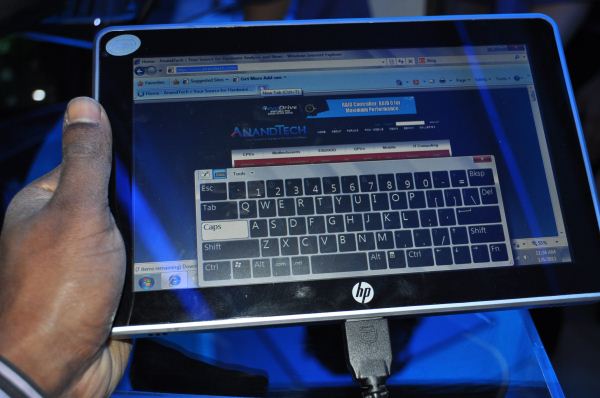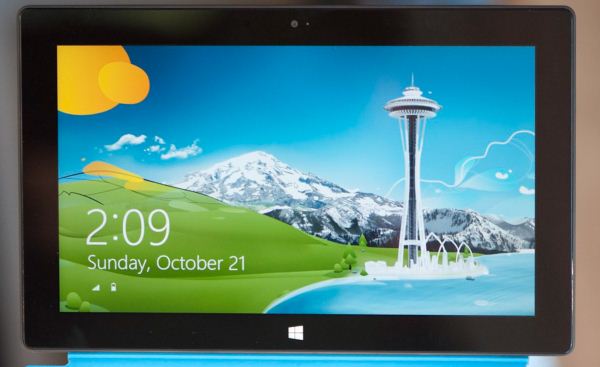The Windows RT Review
by Vivek Gowri & Anand Lal Shimpi on October 25, 2012 12:00 PM EST- Posted in
- Windows RT
- Operating Systems
- Microsoft
- Mobile
- Windows 8
- Tablets
Meet Windows RT
Microsoft’s first serious foray into tablets came just after the turn of the new millenium, with Bill Gates demonstrating the first tablet PC prototype onstage at Comdex in the autumn of 2000. From there, OEMs started releasing tablets based on Windows XP Tablet PC Edition in 2002, with a full range of pen-enabled slates and convertibles releasing over the next few years. In addition to oftentimes prohibitive cost, each had its own set of drawbacks. Convertibles tended to be quite bulky compared to their notebook counterparts (the ThinkPad X-series being a notable exception), while slates were rather difficult to use - a symptom of shoehorning a desktop operating system into a purely touch-centric form factor.
Fast forward a decade, to the beginning of 2010. After a number of conceptual non-starters in the tablet PC space - building tablet PC support into all editions of Windows Vista and 7 (other than Basic/Home Starter), the entire Origami class of devices - Microsoft’s touchscreen devices were floundering. The iPad had been announced to mixed reaction but an extremely high level of anticipation. Microsoft and HP countered with the Slate 500, an Atom-based device shown off at CES 2010 with solid state storage and Windows 7 in roughly the same form factor as Apple’s iPhone OS-based ARM tablet. With speculation pointing to a pricetag of just $549, the Slate appeared to be the most viable hope Microsoft had in trying to make mainstream headway with the tablet PC concept. But shortly after the iPad shipped in April 2010, rumors of the Slate’s demise started to circulate, and after a six month delay, the Slate 500 started shipping as an enterprise-only product in December of that year for $799. HP’s acquisition of Palm (RIP) definitely played a role in the sidelining of the Slate, but more importantly, it essentially spelled the end for the tablet PC. This was news that was perhaps known already, but the Slate saga officially pulled the plug on Microsoft’s original idea of what a tablet was.
The problem was two parts software, one part hardware. Microsoft had developed a very interesting touch-oriented user interface for its handhelds, so at least one part of the equation was relatively straightforward. The hardware issue came down to this: the iOS and Android tablets succeeding in the market ran off ARM system-on-chips, which resulted in slim, power-efficient tablets that had idle times stretching for days. At the time, there was just nothing in terms of x86 hardware that could compete with that in low-power device realm (Clover Trail and Haswell, of course, change this part of the story considerably). The other question? How to converge the touch-centric UI with the classic desktop environment that had been the corner of Windows dating all the way back to 95.
Meet Windows RT. It’s Microsoft’s first major foray into the modern tablet market, the shipping version of Windows-on-ARM, and it’s one of Microsoft’s most important product launches ever. Windows 8 shares the same touch-friendly user interface, but the ARM silicon makes RT an almost entirely tablet-centric operating system, the first for Microsoft. Combined with the focus on premium hardware experiences, this is Redmond’s most serious push to be competitive with the iOS and Androids of the world. How does it fare? Keep reading.












233 Comments
View All Comments
Flemo86 - Saturday, October 27, 2012 - link
With WindowsRT (oh God what an awful name) they're now competing with Apple on Apple's terms, and Apple have had a 5 year head start with iOS. It's just ridiculous that they have .NET, XNA, DirectX etc at such a sweet spot right now, with so many developers on board and able to program whatever the hell they want for the OS (complete with file system!), and then they just change the game entirely by tearing x86 out and putting in what may as well be an Apple chip.They should have come up with a better solution to use ALL existing software and their architectures with every device, not just the "Pro" version. That would've been real competition with the iPad. Imagine being able to port all Xbox live arcade games and every .NET application to the "Windows App Store"/Marketplace (whatever they're calling it). All Microsoft would have to do is verify each piece of software and then bada-bing bada-boom, you've got yourself tens of thousands of apps within the month, and an extremely easy set of tools for devs to use.
Of course, this would've required more effort on the hardware side. Maybe less battery life? A lower screen resolution? More effort on Intel's part? I really hope Windows RT falls by the wayside and Windows 8 Pro tablets become the de facto standard. I hate the idea of them throwing a decade worth of development tools out on one of their operating systems.
Sorry for the rant, just an XNA fan!
stimudent - Saturday, October 27, 2012 - link
Since this system uses Windows and an ARM processor instead of an Intel processor, that makes it 50% respectable. To achieve the other 50%, it would have to have Linux installed.yyrkoon - Sunday, October 28, 2012 - link
Ok, I'll bite.Whats so good about Linux ?
Polish ? Security ? painless upgrade path ? The majority of modern games played on the PC are written for this software platform ?
Or is it that you can feel good about your own self using it for free. Without having to use pirates bay ?
Seriously. Grow up.
Also, please tell me you use Ubuntu. So the rest of us can have a good laugh, and totally disregard what you have to say in the future.
B3an - Sunday, October 28, 2012 - link
That made me laugh, because it's true.foolsgambit11 - Saturday, October 27, 2012 - link
that points out that the autumn of 2000 is just before the turn of the new millenium, not just after....milkod2001 - Sunday, October 28, 2012 - link
@yyrkoonwhat's good about Linux?
lol u gotta be kidding
Android is based on Linux so iOS . That covers all Apple platform and the rest of all smartphones and tablets. Most servers are running on Linux. Not enough?
The majority of modern games played on the PC are written for this software platform ?
The majority of modern games are coded for console kids(Xbox and PS3), then ported to PC.PC games market is only the niche part of games market anyway.
Ubuntu is for geeks/scientisc/developers and not for average uneduceted joes
solipsism - Sunday, October 28, 2012 - link
"Android is based on Linux so [is] iOS."Um... double no.
Android uses the Linux kernel and some underlying code but it is not Linux in the way stimudent is talking about which is why we call it Android and not Linux or Android Linux.
iOS uses Darwin OS and foundations and frameworks found in Mac OS X. "Darwin is built around XNU, a hybrid kernel that combines the Mach 3 microkernel, various elements of BSD (including the process model, network stack, and virtual file system), and an object-oriented device driver API called I/O Kit.[6] The hybrid kernel design compromises between the flexibility of a microkernel and the performance of a monolithic kernel." All this came from NeXTSTEP and BSD before that. There is no Linux in iOS.
yyrkoon - Sunday, October 28, 2012 - link
Yeah notable features at least in my mind is that Android uses ( as standard ) A virtual machine to run each application. Kind of, but not the same as JRE..Big difference from Linux just in that. The architecture is really interesting. Despite the fact that java is the primary development language used for creating apps. Unless you choose to write native C/C++, or use a third party "scripting language". Passed that I'm sure you'd be able to write standard kernel level drivers, but yeah . . .
Mono for android is particularly interesting to me, but a bit pricey.
yyrkoon - Sunday, October 28, 2012 - link
Ubuntu is garbage.Architecturally it can be unstable, it has a very poor upgrade path track record, and they want to put google search on your desktop.
All that despite the fact that is based on one of the better distro's around IMHO. Debian.
yyrkoon - Sunday, October 28, 2012 - link
Oh and yeah to follow up on what was left out of the comments to your post.Most network admins I know that want the least bit of hassle when dealing with servers do not always opt for Linux. Just for the sake of using Linux. These people realize that an operating system is a tool, all of which have their strong and weak points. With OSX being somewhere in the middle. My post above down to the first four lines of text were pure sarcasm. With the fifth and sixth lines being tongue in cheek.
Any operating system is only as good as the user using it. It does not matter what it is. IF the user is a dumbshit, or does not care .The given OS will probably not work optimally (ever). With varying degrees of optimal operation in between, based on how well the user understands his/her operating system.
Also, we're talking computers here, not gaming consoles. With *ALL* PC games being written on some form of a PC. For the PC. Some being Linux dev machines for cross platform development, but most being Windows / visual studio developers. Ask around the game development community sometime, and ask who uses Windows / visual studio versus Linux / eclipse or some other IDE. You'll find out for yourself. This is for a good reason too. Windows / directx being the prevalent software gaming platform. For the PC. Not to mention the fact that porting games to the xbox is fairly trivial now days. Depending on the tool set you use.
"Ubuntu is for geeks/scientisc/developers and not for average uneduceted joes"
Uh yeah . . . I think this "sentence" speaks for its self.